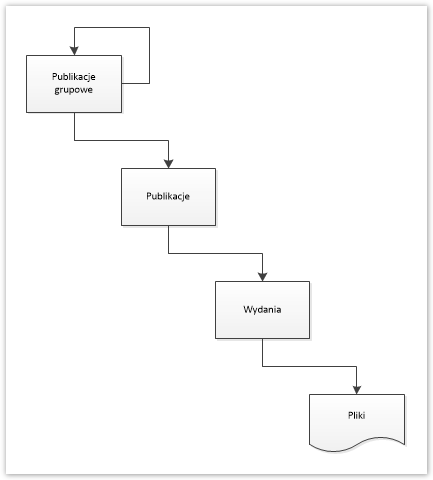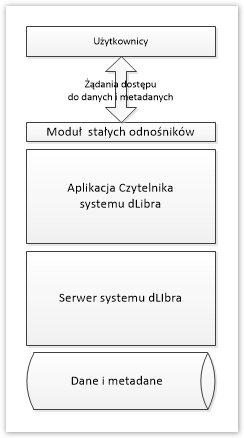Introduction
One very important aspect of making digital objects available online is the ability to create permalinks to those objects. Such links may be useful, for example, in a scientific work, as an element of a bibliography, or for referring to digital objects in external services, such as library catalogs, bibliographic bases, or even Wikipedia. This section is about the way in which links to digital objects are created in the dLibra system; it is also explained which of them should be used to ensure the maximum durability of the references.
The Data Model of the dLibra System
In the image below, the basic data model in the dLibra system is shown. The model includes:
- group publications – elements which group other group publications and standard publications; group publications can represent, for example, a whole journal or its particular annual or monthly set;
- publications – elements which represent a single digital object in the system; that object may have many versions (editions); it can be, for example, a book or a single number of a journal;
- editions – the versions of a publication; they may correspond to the actual subsequent editions of a book, but they can also be created, for example, when another digital form of the same physical object is made available; many editions of the same publication can exist simultaneously in the system, but in practice only the most recent edition is usually shown to end users; and
- files – the files comprising particular editions of a publication; they contain the data/information which is downloaded by the user using the digital library.
Fig. 1. The basic data model in the dLibra system is shown.
In the table below, examples of particular elements of the data model are shown, together with links
| Object type | Object name/title | The data necessary for an unequivocal identification in the dLibra system | The link used in the website interface. | The permalink. |
|---|---|---|---|---|
| Group publication | Studies in Physical Culture and Tourism | Publication ID: 4081 | http://www.wbc.poznan.pl/dlibra/publication/4081 | http://www.wbc.poznan.pl/publication/4081 |
| Group publication | Studies in Physical Culture and Tourism 2012 | Publication ID: 263176 | http://www.wbc.poznan.pl/dlibra/publication/263176 | http://www.wbc.poznan.pl/publication/263176 |
| Group publication | Studies in Physical Culture and Tourism 2012 Vol.19 No.3 | Publication ID: 290787 | http://www.wbc.poznan.pl/dlibra/publication/290787 | http://www.wbc.poznan.pl/publication/290787 |
| Group publication | Part II - Biology and exercise physiology | Publication ID: 291297 | http://www.wbc.poznan.pl/dlibra/publication/291297 | http://www.wbc.poznan.pl/publication/291297 |
| Publication | Insulin sensitivity and blood lipid profile in women recreationally practicing horseback riding | Publication ID: 291316 | http://www.wbc.poznan.pl/dlibra/publication/291316 | Description: http://www.wbc.poznan.pl/publication/291316 Content (the main file): http://www.wbc.poznan.pl/publication/291316/content |
| Edition | Insulin sensitivity and blood lipid profile in women recreationally practicing horseback riding | Edition ID: 239649 | Description: http://www.wbc.poznan.pl/dlibra/publication/291316/239649 Content (the main file): http://www.wbc.poznan.pl/Content/239649/ | None – using the permalink to the publication is recommended. |
| File | 7_Studies_2012_3_135.pdf | Edition ID: 239649 Full file name: 7_Studies _2012_3_135.pdf | http://www.wbc.poznan.pl/Content/239649/7_Studies_2012_3_135.pdf | None – using the permalink to the publication is recommended. |
Table 1. Examples of particular elements of the data model in the dLibra system illustrated with the example of a journal available in the Digital Library of Wielkopolska.
The differentiation between a file and the main file of a publication should be briefly discussed here. Digital objects may contain of one or more files. In the latter case, it is necessary to determine which file should be the first one to be viewed by a reader. For HTML pages, that file is customarily called “index.html”. However, since various types of files can be stored in the dLibra system, the main (starting) file is indicated by the editor of the digital library while the object is being placed in the library. Here is a good illustration of the differentiation:
- http://www.wbc.poznan.pl/Content/8711/ – the link to the content of the edition with identifier number 8711 in the Digital Library of Wielkopolska redirects the reader to the main file of the publication.
- http://www.wbc.poznan.pl/Content/8711/index.html – the link to the main file of the content of the edition with identifier number 8711 in the Digital Library of Wielkopolska, obtained as a result of a redirection from the http://www.wbc.poznan.pl/Content/8711/ address.
- http://www.wbc.poznan.pl/Content/8711/toml-014.jpg – the link to one of the files comprising the content of the edition with identifier number 8711 in the Digital Library of Wielkopolska, obtained by browsing the publication.
The Types of Links and the Manner of Processing Reader Queries
In table 1, two types of links to particular elements of the data model in the dLibra system are shown. That differentiation results from the assumed manner of processing reader queries, illustrated in figure 2. The key differentiation here is the one between the reader application and the permalink module. The task of the module is to make a part of the links in the dLibra system independent from the technological changes in the reader application which are related to developing it, making its subsequent versions available, and technological modernizations. Examples of such permalinks are shown in the last column of table 1. The task of the module which manages those links is ensuring their unchanged functioning despite the changes introduced in the subsequent versions of the reader application. The penultimate column in table 1 contains links which have been unchanged in the dLibra system since its 0.4 version, published in 2004. Those links, however, may – in theory – be changed in the future, for technical reasons. That is why it is recommended that the permalinks presented in the last column be used for creating references to objects.
Fig. 2. A simplified schema of the architecture of the dLibra system.
Permalinks and Exceptional Situations
In some specific cases, permalinks cannot be offered solely on the basis of the digital library system. When we look at a sample permalink (for example, http://www.wbc.poznan.pl/publication/290787), we can say that it has two elements which can change. They are:
- the domain address (in the example: www.wbc.poznan.pl) – it can change, for example, when:
- the owner of the domain forgets to prolong its registration, and another person buys the domain and begins to use it for other purposes;
- the home institution changes its name and domain (for example, from an academy to a university); and
- the nature of the digital library is changed (for example, from institutional to regional), together with its domain;
- the system identifier of a publication in the digital library (in the example: 290787) – it can change, for example, as a result of an equipment failure which causes a data loss; if the administrator does not have a backup copy of the digital library but has the copies of particular objects and their metadata, then the only solution is to rebuild the digital library from scratch; in such a case, although the domain address of the digital library and the software do not change, the system identifiers of particular objects will most likely change because their assignment depends on the order in which they are entered in the system.
In order to prevent such unique problems, identifier systems external with respect to the digital library are used. The most popular commercial system of that type are DOI identifiers, and one of the free alternatives is the Handle system. In Polish digital libraries, identifiers based on the OAI ID specification, managed by the Digital Library Federation, have become common. Such external identifiers are entered as an element of the descriptive metadata of an object, so they become independent from system identifiers. A domain address can be made independent with the use of a global localization service (so-called resolver).
For example, the following ways of referring to the article titled “The use of SEM morphoscopy in researching the litho-pedogenetic environments evolution of Late Pleistocene and Holocene” and available in the Digital Repository of Scientific Institutes can be used:
- http://rcin.org.pl/igipz/publication/13932 – a reference on the level of the digital library,
- http://fbc.pionier.net.pI/id/oai:rcin.org.pl:2289 – a link which makes use of an OAI identifier, realized on the basis of a service of the Digital Library Federation
- http://fbc.pionier.net.pI/id/10.7163/GPol.2011.Sl.3 – a link which makes use of a DOI identifier, realized on the basis of a service of the Digital Library Federation; and
- http://dx.doi.Org/10.7163/GPol.2011.Sl.3 – a link which makes use of a DOI identifier, realized on the basis of a service of the dx.doi.org portal.
Summary
By way of a summary, the table below contains the advantages and disadvantages of particular kinds of links to objects available in the dLibra system.
| Object type | The link used in | The effect of calling the object | Comment | Recommended? |
|---|---|---|---|---|
Group publication | http://www.wbc.poznan.pl/publication/4081 | Displaying the structure of a group publication |
| |
| http://www.wbc.poznan.pl/dlibra/publication/4081 | Displaying the structure of a group publication |
| ||
| Publication | http://www.wbc.poznan.pl/dlibra/publication/291316 | Displaying the metadata of the only available release of the given publication or a list of links to the releases of that publication when there is more than one release of that publication (in practice, that is a very rare occurrence). |
| |
| http://www.wbc.poznan.pl/publication/291316 | Displaying the metadata of the only available release of the given publication or a list of links to the releases of that publication when there is more than one release of that publication (in practice, that is a very rare occurrence). |
| ||
| http://www.wbc.poznan.pl/dlibra/publication/291316/edition/239649/content | Displaying the content of the only available release of the given publication or a list of links to the releases of that publication when there is more than one release of that publication (in practice, that is a very rare occurrence). |
| ||
| Release | http://www.wbc.poznan.pl/dlibra/publication/291316/edition/239649 | Displaying the metadata of the given publication release. |
| |
| File | http://www.wbc.poznan.pl/Content/239649/ | Displaying the main file of the given publication release |
| |
| http://www.wbc.poznan.pl/Content/239649/7_Studies_2012_3_135.pdf | Displaying a particular PDF file of the given publication release |
| ||
| http://www.wbc.poznan.pl/Content/239649/7_Studies_2012_3_135.pdf#page=3 | Displaying a particular fragment (page 3) of a particular PDF file of the given release of the publication. |
|
Table 2 The advantages and disadvantages of particular kinds of links to objects in the dLibra system.

